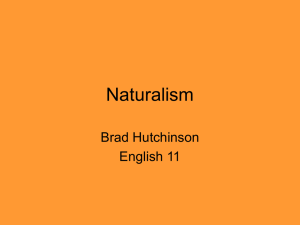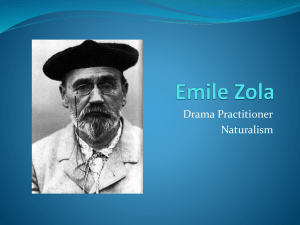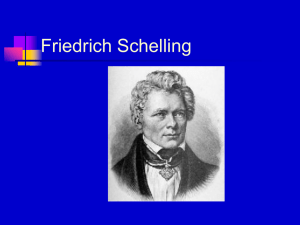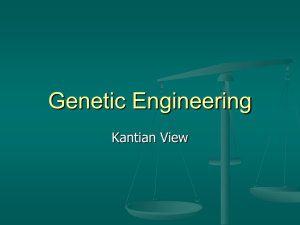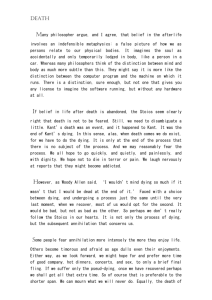France`s NC
advertisement
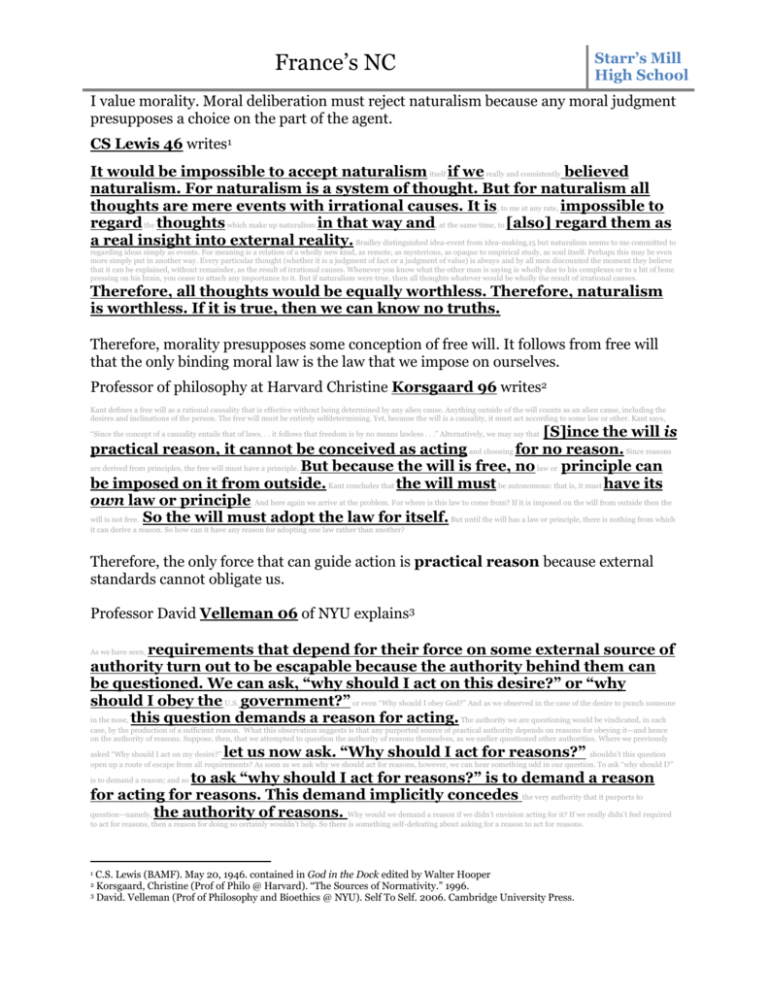
France’s NC Starr’s Mill High School I value morality. Moral deliberation must reject naturalism because any moral judgment presupposes a choice on the part of the agent. CS Lewis 46 writes1 It would be impossible to accept naturalism itself if we really and consistently believed naturalism. For naturalism is a system of thought. But for naturalism all thoughts are mere events with irrational causes. It is, to me at any rate, impossible to regard the thoughts which make up naturalism in that way and, at the same time, to [also] regard them as a real insight into external reality. Bradley distinguished idea-event from idea-making,15 but naturalism seems to me committed to regarding ideas simply as events. For meaning is a relation of a wholly new kind, as remote, as mysterious, as opaque to empirical study, as soul itself. Perhaps this may be even more simply put in another way. Every particular thought (whether it is a judgment of fact or a judgment of value) is always and by all men discounted the moment they believe that it can be explained, without remainder, as the result of irrational causes. Whenever you know what the other man is saying is wholly due to his complexes or to a bit of bone pressing on his brain, you cease to attach any importance to it. But if naturalism were true, then all thoughts whatever would be wholly the result of irrational causes. Therefore, all thoughts would be equally worthless. Therefore, naturalism is worthless. If it is true, then we can know no truths. Therefore, morality presupposes some conception of free will. It follows from free will that the only binding moral law is the law that we impose on ourselves. Professor of philosophy at Harvard Christine Korsgaard 96 writes2 Kant defines a free will as a rational causality that is effective without being determined by any alien cause. Anything outside of the will counts as an alien cause, including the desires and inclinations of the person. The free will must be entirely selfdetermining. Yet, because the will is a causality, it must act according to some law or other. Kant says, [S]ince the will is practical reason, it cannot be conceived as acting and choosing for no reason. Since reasons are derived from principles, the free will must have a principle. But because the will is free, no law or principle can be imposed on it from outside. Kant concludes that the will must be autonomous: that is, it must have its own law or principle. And here again we arrive at the problem. For where is this law to come from? If it is imposed on the will from outside then the will is not free. So the will must adopt the law for itself. But until the will has a law or principle, there is nothing from which “Since the concept of a causality entails that of laws. . . it follows that freedom is by no means lawless . . .” Alternatively, we may say that it can derive a reason. So how can it have any reason for adopting one law rather than another? Therefore, the only force that can guide action is practical reason because external standards cannot obligate us. Professor David Velleman 06 of NYU explains3 requirements that depend for their force on some external source of authority turn out to be escapable because the authority behind them can be questioned. We can ask, “why should I act on this desire?” or “why should I obey the U.S. government?” or even “Why should I obey God?” And as we observed in the case of the desire to punch someone in the nose, this question demands a reason for acting. The authority we are questioning would be vindicated, in each As we have seen, case, by the production of a sufficient reason. What this observation suggests is that any purported source of practical authority depends on reasons for obeying it—and hence on the authority of reasons. Suppose, then, that we attempted to question the authority of reasons themselves, as we earlier questioned other authorities. Where we previously let us now ask. “Why should I act for reasons?” asked “Why should I act on my desire?” shouldn’t this question open up a route of escape from all requirements? As soon as we ask why we should act for reasons, however, we can hear something odd in our question. To ask “why should I?” to ask “why should I act for reasons?” is to demand a reason for acting for reasons. This demand implicitly concedes the very authority that it purports to question—namely, the authority of reasons. Why would we demand a reason if we didn’t envision acting for it? If we really didn’t feel required is to demand a reason; and so to act for reasons, then a reason for doing so certainly wouldn’t help. So there is something self-defeating about asking for a reason to act for reasons. C.S. Lewis (BAMF). May 20, 1946. contained in God in the Dock edited by Walter Hooper Korsgaard, Christine (Prof of Philo @ Harvard). “The Sources of Normativity.” 1996. 3 David. Velleman (Prof of Philosophy and Bioethics @ NYU). Self To Self. 2006. Cambridge University Press. 1 2 France’s NC Starr’s Mill High School Even under the conditions of naturalism we would still act on practical reason because moral consistency is the natural aspiration of human beings. Velleman-24 continues acting for reasons is essential to being a person, something to which you unavoidably aspire. In order to be a person, you must have an approach to the world that is sufficiently coherent and constant to qualify as single, continuing point-of-view. And part of what gives you a Kant offered an explanation for this oddity. His explanation was that single, continuing point-of-view is your acceptance of particular considerations as having the force to reasons whenever they are true. We might be tempted to make this point by saying that you are a unified, persisting person and hence that you do approach practical questions from a point-of-view framed by constant reasons. But this way of making the point wouldn’t explain why you feel compelled to act for reasons; it would simply locate action for reasons in a broader context, as part of what makes you a person. One of Kant’s greatest insights, however, is that a unified, persisting person is something that you are because it is something that you aspire to be. Antecedently to this aspiration, you are merely aware that you are capable of being a person. But any creature aware that it is capable of being a person, in Kant’s view is ipso facto capable of appreciating the value of being a person and is therefore ineluctably drawn toward personhood. The value of being a person in the present context is precisely that of attaining a perspective that Right now, you would rather sleep than swim, but you also know that if you roll over and sleep, you will wake up wishing that you had swum instead. Your impulse to decide on the basis of reasons is, at bottom an impulse to transcend these momentary points-of-view, by attaining a single, constant perspective that can subsume both of them. transcends that of your current, momentary self. It follows from practical reason that rational beings have inherent value. Christine Korsgaard 96 writes5 This is just a fancy new model of an argument that first appeared in a much simpler form, Kant’s argument for his Formula of Humanity. The form of relativism with which Kant began was the most elementary one we encounter - the relativity of value to human desires and interests. He started from the fact that when we make a choice we must regard its what it is that makes these objects good, and, rejecting one form of realism, he decided that the goodness wa[i]s not in the objects themselves. Were it not for our desires and inclinations, we would not find their objects good. Kant saw that we take things to be important because they are important to us - and he concluded that we must therefore take ourselves to be important. In this way, the value of humanity itself is implicit in every human choice. If normative skepticism is to be avoided - if there is any such thing as a reason for action - then humanity as the source of all reasons and values must be valued for its own sake. object as good. His point is the one I have been making - that being human we must endorse our impulses before we can act on them. Kant asked 4 5 David. Velleman (Prof of Philosophy and Bioethics @ NYU). Self To Self. 2006. Cambridge University Press Korsgaard, Christine (Prof of Philo @ Harvard). “The Sources of Normativity.” 1996. France’s NC Starr’s Mill High School I value morality. Human worth is an intrinsic moral good as the source of moral value. Christine Korsgaard 96 writes6 This is just a fancy new model of an argument that first appeared in a much simpler form, Kant’s argument for his Formula of Humanity. The form of relativism with which Kant began was the most elementary one we encounter - the relativity of value to human desires and interests. He started from the fact that when we make a choice we must regard its what it is that makes these objects good, and, rejecting one form of realism, he decided that the goodness wa[i]s not in the objects themselves. Were it not for our desires and inclinations, we would not find their objects good. Kant saw that we take things to be important because they are important to us - and he concluded that we must therefore take ourselves to be important. In this way, the value of humanity itself is implicit in every human choice. If normative skepticism is to be avoided - if there is any such thing as a reason for action - then humanity as the source of all reasons and values must be valued for its own sake. object as good. His point is the one I have been making - that being human we must endorse our impulses before we can act on them. Kant asked Therefore the criterion is respecting human worth. 6 Korsgaard, Christine (Prof of Philo @ Harvard). “The Sources of Normativity.” 1996. France’s NC Starr’s Mill High School I value morality as implied by the resolution. Morality must be grounded on a conception of absolute good. Professor Patrick Lee 08 writes7 one chooses an act[s]ion, one chooses it for a reason, that is, for the sake of some good one thinks this action will help to realize. That good may itself be a way of realizing some further good, and that good a means to another, and so on. But the chain of instrumental goods cannot be infinite. So, there must be some ultimate reasons for one’s choices, some goods which one recognizes as reasons for choosing which need no further support, which are not mere means to some further good. The basis of this point can be explained, at least in part, in the following way. When The ultimate good is the value of humans as ends in themselves. Thomas Hill 91 writes8 Most valuable things have value only because valued by human beings. Their value is derivative from the fact that they serve our interests and desires. Even pleasure, which we value for its own sake, has only derivative value, that is, value dependent on the contingent [on the] fact that human beings want it. Now if valuers confer derivative value on things by their preferences and choices, those valuers must themselves have value. In fact, they must have value independent of, and superior to, the derivative values they create. The guiding analogy is The second argument is roughly this: how we value ends. We value certain means because they serve certain intermediate ends, which in turn we value because they contribute finally to our ultimate ends, that is, what we value for its own sake. The value of the means and the intermediate ends is derivative from the value of the ultimate ends; unless we value the ultimate end, the means Since the ultimate source of the value of our contingent ends, such as health, wealth, and even pleasure, is their being valued by human beings, human beings, as valuers, must be valued for their own sakes. and intermediate ends would be worthless to us. So, it seems, the source of derivative value must itself be valuable for its own sake. Therefore the criterion is respecting human worth. “The Nature and Basis of Human Dignity,” Patrick Lee, John N. and Jamie D. McAleer Professor of Bioethics, Institute of Bioethics @ Franciscan University of Steubenville, and Robert George, McCormick Professor of Jurisprudence, Princeton University. Ratio Juris. Vol. 21 No. 2 June 2008 (173–93) 8 Hill, Thomas. Jr. “Self-regarding suicide: A modified Kantian view” in Autonomy and Self-Respect. Cambridge University Press. 1991. Pg. 102-103. 7 France’s NC Starr’s Mill High School I contend that deliberate killing disrespects human worth. FM Kamm explains9 it is the permission to kill, the endorsement of killing, not any actual killing, that can eliminate a right not to be killed from the moral system. If the comparable right is violated many times over, this does not involve morality endorsing any such violation; though many people may die, we do not say that it was correct that any of them died, which is what an endorsement, whether or not it eliminates the right, would involve. This implies that though people may die if there is a constraint, the conception of each person that is morally endorsed involves a higher degree of inviolability. It is important to see that On some views, non-consequentialist constraints are best characterized as concerned with the distinction, that between what I as an agent do and what happens; I must not do something, even if this means that something else happens. Without denying that, in a non-agent-concerned sense, this is true, the being presented here emphasizes a different distinction, that between what it is permissible to do to people (i.e., their status), and what happens to people (their fate, which may involve more rights violated). What I do, rather than what happens, is important when it reveals what it is permissible to do, that is, what the status of a person is. The realm of status is not what happens to people. If many are killed in violation of their rights because we may not kill one to save them, their status as individuals who should not be killed does not change. If it were permitted to kill one to save them, their status would change. We may be concerned about what happens, but be unwilling to prevent it in a way that is only consistent with a change in status. It is a mistake to see an opposition between the rights of the one person and the rights of all others, since the status of everyone is affected by the way it is permissible to treat one person. Kamm, F.M. “Inviolability.” Midwest Studies in Philosophy. Volume 20 Issue 1, Pages 165 – 175. 1995. http://www3.interscience.wiley.com/journal/120147219/abstract 9
